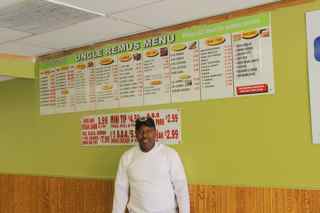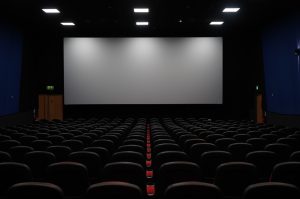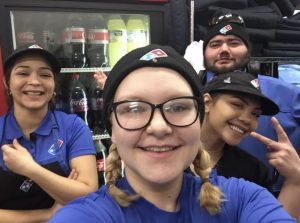
The owner of a barbecue joint on Chicago’s West Side protects his business from robberies and drug dealers outside the front door by feeding all people in the community, including the homeless and drug addicts.
Located on the 4200 Block of West Madison Street, Uncle Remus Chicken & Barbeque is in the high-crime neighborhood of West Garfield Park. According to an analysis of crimes reported by the Chicago Police, there were seven burglaries and five robberies just in the first seven days of October. By definition, a burglary involves the unlawful entry into a building. Owner Gus Rickette, 55, earns a special level of respect and protection from the community by not letting anyone go hungry.
“We have always built our business on giving back to the community,” Rickette said.
By 10 a.m. last Tuesday, customers tried to walk in Uncle Remus Chicken & Barbeque, even though it does not open until 11 a.m. It may have been early for barbecue, but people were ready to eat and anyone who walks through Rickette’s restaurant can expect a good meal – even if they are unable to pay.
“He is something else,” said Tremal Curtis, patron and friend of Rickette. “If you don’t have enough for your order, he will still give you food.”
Curtis said Rickette lets homeless people mop floors and clean windows just to give them jobs.
Now a franchise with multiple locations throughout the city, Uncle Remus Chicken & Barbeque evolved from restaurants Rickette’s parents opened in the 1960s. One of the restaurants, Royal Chicken, burned down during the Martin Luther King riots. With 12 children in the household, Rickettes’s family was very poor, but his father started businesses to employ African-Americans. Rickette said there was crime back then, but Black people looked out for one another. And, there were more Black businesses.
Rickette said today there are no more than 15 Black business owners on his block.
“African-American businesses on the West Side in the Austin and Lawndale areas are extinct now with different nationalities coming into the community,” Rickette said.
He said non-Black businesses only employ one, maybe two Black people.
“We are an endangered species in our own community” Rickette said.
He said this is why young Black men are dealing drugs in front of businesses on the block, including a liquor store across the street Rickette said was just burglarized. The liquor store did not want to comment.
Rickette said if there were more police squad cars on the block, there would be less crime. He has attended police board meetings requesting this but was told resources are limited. He said people are afraid to come into some of the businesses because of drug dealers hanging out, but the real solution is not the police.
The solution is more Black business owners serving their communities by employing Black people and helping Black entrepreneurs start their own businesses. And Rickette leads by example: 75 percent of his workforce is Black.
Another Black business owner, Henry Henderson, combats crime by rooting himself in the community he serves.
Henderson is from Mississippi and as a child worked on a cotton plantation, earning only $2.50 a day. He moved to Chicago in 1972 and lives on the West Side in Austin. He is the owner of Ruby’s, a soul food restaurant located on the same street as Uncle Remus Chicken & Barbeque at 3175 West Madison Street. Ruby’s opened for the first time last Saturday.
Henderson said he enjoys running a business on the West Side, and more black businesses are needed in the area. He said police surveillance is good, and he’s had no problems with robberies or drug dealing. If he sees drug dealers outside Ruby’s front door, he just asks them to leave and they do. He agrees with Rickette: more Black businesses would help prevent crime.
Six months ago, Henderson had a meeting with other Black business owners and some of them discussed asking police to stop drug dealing in front of their businesses. Henderson had no interest in making the dealers leave but said, “You got to let them know there is a better way. If I can do it, they can.” Both Henderson and Rickette feel in control of their businesses regardless of being in a high-crime area of Chicago.
Business operates as usual at Uncle Remus Chicken & Barbeque. The restaurant has always been a late night business and does not close until midnight on weekdays, sometimes 2 a.m. on weekends. Rickette does not even remember the last time someone tried to break into his restaurant. As a Black business owner in a predominately Black community, Rickette is protected because he sympathizes with their circumstances. He said non-Black business owners do not consider people on welfare. They don’t lower their prices or give back to the Black community.
“They don’t understand or care about the Black struggle,” he said.







Be First to Comment